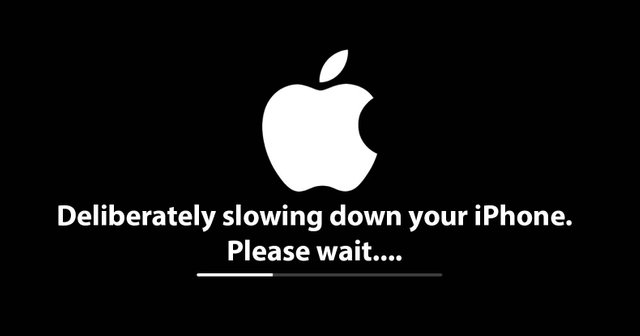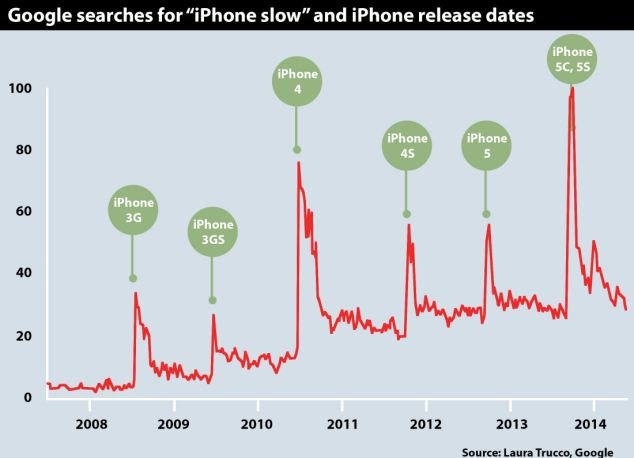
Years ago, an article in the Daily Mail referenced a Harvard study which showed that just ahead of Apple launching a new iPhone, searches for 'iPhone slow' spiked on Google.

Disinformation sites have been reporting this for years as proof a Harvard study found that Apple deliberately slows down phones upon the release of new ones. While those articles have all been fake news designed to get clicks, we now have real proof that Apple throttles processor speeds upon new updates. In fact, Apple admitted to it.
The recent discussion about throttled processor speed began after a Reddit post went viral last week. The op wrote that Apple appears to be slowing down old iPhones that have low-capacity batteries. Indeed, they are.
According to Apple, this deliberate throttling of processor speeds on older phones is an effort to keep them running smoothly. Apple claims they are slowing down your older iPhone so they can keep your iPhone from unexpectedly shutting down.
https://twitter.com/sam_siruomu/status/943400254451335168
The throttling, according to Apple, began last year—despite years of reports from users. Instead of fixing a hardware issue after users began to report widespread malfunctions with the iPhone 6s battery, Apple started to algorithmically alter how the phone uses power. The phone feels slower because it actually is slower. Apple says this improves safety.
When reached for comment, Apple basically confirmed the findings but disputes the assumed intention:
Instead of telling customers who bought the phones—which cost upwards of $850—that they were going to throttle the phone's performance, Apple simply rolled out the update and told no one. And now, they have the audacity to call this deliberate throttling a "feature."Our goal is to deliver the best experience for customers, which includes overall performance and prolonging the life of their devices. Lithium-ion batteries become less capable of supplying peak current demands when in cold conditions, have a low battery charge or as they age over time, which can result in the device unexpectedly shutting down to protect its electronic components.
Last year we released a feature for iPhone 6, iPhone 6s and iPhone SE to smooth out the instantaneous peaks only when needed to prevent the device from unexpectedly shutting down during these conditions. We’ve now extended that feature to iPhone 7 with iOS 11.2, and plan to add support for other products in the future.
It's not just iPhone 6 users either. As the Verge reports, Geekbench developer John Poole has mapped out performance for the iPhone 6S and iPhone 7 over time, and has come to the conclusion that Apple’s iOS 10.2.1 and 11.2.0 updates introduce this throttling for different devices. iOS 10.2.1 is particularly relevant, as this update was designed to reduce random shutdown issues for the iPhone 6 and iPhone 6S. Apple’s fix appears to be throttling the CPU to prevent the phone from randomly shutting down. Geekbench reports that iOS 11.2.0 introduces similar throttling for low iPhone 7 low-capacity batteries.
Now, this tech giant has begun damage control and is telling everyone that they had to do this to keep the devices working smoothly. But this raises the question: would Apple customers willingly buy a device that they know will be throttled in upcoming updates and not perform like they expect?
Instead of dropping the performance of the devices which many of the users are probably still paying for through their cell carriers, Apple should replace the batteries—at no charge.
As CNBC notes, sure it's an expensive undertaking for Apple, but a user should be guaranteed a certain level of performance for the lifetime of a product, until Apple stops supporting it with new software.
However, it appears Apple has no intention of doing so, most likely because the throttling of older iPhones undoubtedly boosts sales of newer ones.
Apple is not alone in this facade of product integrity. In fact, selling products that are designed to fail is now an unfortunate reality among most consumer items. It even has a name—planned obsolescence.
Planned obsolescence or built-in obsolescence is a policy of planning or designing a product with an artificially limited useful life, so it will become obsolete after a certain period of time. The rationale behind the strategy is to generate long-term sales volume by reducing the time between repeat purchases (referred to as "shortening the replacement cycle").
Sound familiar? This appears to be exactly what Apple is doing and it is no coincidence that they are the largest tech company in the world.
The good news is that consumers hold the power. Without your dollars, these companies have nothing. How Apple proceeds is up to you. If you keep paying for a device that you know will begin to degrade six to eight months after you buy it, this is your fault. However, consumers have the power to stop purchasing these iPhones until Apple makes it right.
Will you vote with your dollars and refuse to give the 8th largest company in the world your money until they fix this problem, or, will you roll over and take it, letting them walk all over you? The choice is yours.
Congratulations @tftproject, this post is the sixth most rewarded post (based on pending payouts) in the last 12 hours written by a Superuser account holder (accounts that hold between 1 and 10 Mega Vests). The total number of posts by Superuser account holders during this period was 1229 and the total pending payments to posts in this category was $8979.99. To see the full list of highest paid posts across all accounts categories, click here.
If you do not wish to receive these messages in future, please reply stop to this comment.
Downvoting a post can decrease pending rewards and make it less visible. Common reasons:
Submit
I think not only Apple, but also Samsung is doing that because when I first purchased my note4, it was faster but after just one upgrade, it become slower and the power drain has increased significantly.
Downvoting a post can decrease pending rewards and make it less visible. Common reasons:
Submit
This is the reason I don't want to update iOS on my SE model...
Downvoting a post can decrease pending rewards and make it less visible. Common reasons:
Submit
La empresa debería garantizar la vida útil del equipo.
Downvoting a post can decrease pending rewards and make it less visible. Common reasons:
Submit
It can be true but i think big percentage of slowing causing because of new updates. Because softwares are getting better faster than hardwares.
Downvoting a post can decrease pending rewards and make it less visible. Common reasons:
Submit
Read the article properly. They're not saying the phones her slower she to increased system requirements of iOS. They are saying they place a limit on processor power
Downvoting a post can decrease pending rewards and make it less visible. Common reasons:
Submit
It won't happen, but consumer protection agencies should come down hard. Even a class action.
If I have an old iPhone, I should be able to buy a new battery and expect the phone to more or less operate as before.
The fact that they are purposefully limiting the processing power of a device that was purchased to certain specifications is a gross abuse of trust.
Downvoting a post can decrease pending rewards and make it less visible. Common reasons:
Submit
Yeah, that is already happening: http://fortune.com/2017/12/22/apple-iphone-batteries-slow-lawsuit/
Downvoting a post can decrease pending rewards and make it less visible. Common reasons:
Submit
yes that happened since my comment - good to see they are being made accountable.
Downvoting a post can decrease pending rewards and make it less visible. Common reasons:
Submit
They do everything to increase sales of new models of their devices. Business and nothing personal
Downvoting a post can decrease pending rewards and make it less visible. Common reasons:
Submit
time to invest in apple
Downvoting a post can decrease pending rewards and make it less visible. Common reasons:
Submit
That is absolutely true. Everyone who has iPhone knows that.
Downvoting a post can decrease pending rewards and make it less visible. Common reasons:
Submit
The old iPhones slow down because the software updates are NOT made for those phones.. they’re 150% geared toward the newest phone. So the more software updates you do the more it’s gonna slow down your phone
Downvoting a post can decrease pending rewards and make it less visible. Common reasons:
Submit
Yes, it makes sense to protect the older hardware from failing on the new software updates. I wouldn't want my phone to break under the new software and not upgrading is not an option due to bug and security fixes. This makes sense...
Downvoting a post can decrease pending rewards and make it less visible. Common reasons:
Submit
Should read 'Apple confirms something everybody already knew'.
Downvoting a post can decrease pending rewards and make it less visible. Common reasons:
Submit
is iPhone 7 getting this type of problem?
Downvoting a post can decrease pending rewards and make it less visible. Common reasons:
Submit
I don't think it is a good thing for a company to deliberately slow down these devices. On the other hand. To simply exist, a company, not only Apple doesn't fare well if any of their products would last a lifetime. Also, I think it is no coincidence that huge companies like Apple are being watched trough a microscope. I would love to see a product you buy will behave the same after a few months. Heck, I even hope Apple will stop slowing down our OWN devices. But I really don't think stop buying these is the solution. Have you even thought about how many people should stop buying these products before this giant even will notice this? And what will you buy? For me personally, I must admit, I have never experienced my iPhone slowing down that fast. Yes, after a year or 2/3 and for me that is the trigger to buy their new product. I agree, you have a choice, so that is always a good thing.
Downvoting a post can decrease pending rewards and make it less visible. Common reasons:
Submit
they will take you to justice lol , nice post thanks :)
Downvoting a post can decrease pending rewards and make it less visible. Common reasons:
Submit